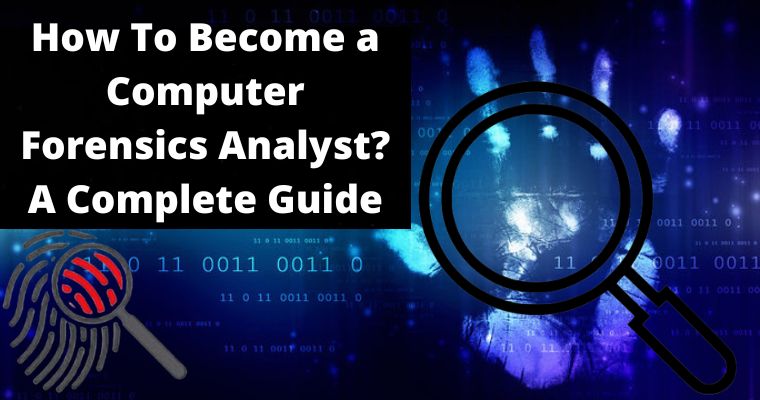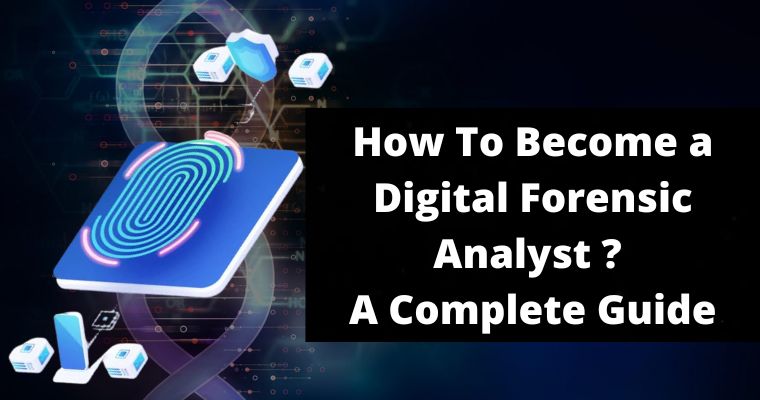Analysts in computer forensics perform critical positions on cybersecurity and investigative teams.
These experts excel in collecting and reviewing data about cyberattacks and illicit online behavior.
They apply specialized data retrieval and event investigation capabilities to cases including espionage, coordinated cybercrime, malware, theft, terrorism, and illegal content storing and sharing.
Influential analysts have sharp critical minds, keen eyes for detail, and sophisticated technological skills.
They also recognize the ethical principles that govern police investigations and are skilled communicators. Although some computer forensics experts work with private firms, most of their job openings are in law enforcement.
These practitioners have an exceptionally bright career outlook. The mighty Bureau of Labor Statistics (BLS) forecasts a 32.1% increase in information security employment between 2019 and 2029.
Table of Contents
What is a Computer Forensic Analyst All About?
Analysts of computer forensics aid in the prosecution of crimes and cybersecurity accidents.
In certain instances, they work to retrieve information that has been obscured, encrypted, or removed in connection with the event. They further protect data privacy by adhering to a chain of custody that guarantees its admissibility in court.
Additional and related responsibilities include providing expert advice to law enforcement and judges about the authenticity of visual evidence.
In some instances, they direct or take part in interviews with criminals or victims. Digital forensics experts also assist with the preparation of evidence for court trials.
Computer forensics specialists are often used in the criminal justice system. They are also used in various private businesses, including financial management, information technology, computing, network security, and defense.
Privately hired digital forensics experts supplement an organization’s internal cybersecurity unit to offer an extra layer of protection in the case of a hack or cybercrime.
Most electronic forensics analysts advance in their careers to educating newly emerging experts and junior team members. However, getting to this stage has its own set of obstacles.
Since many digital forensics specialists work long and irregular hours, particularly when solving active crimes, the practice necessitates dedication and adaptability.
The lists that follow summarise the core soft and hard skills that potential digital forensics analysts need to succeed.
A Normal Day For a Computer Forensic Analyst
A computer forensics analyst’s daily duties differ depending on factors such as business, position, and individual cases. Often an analyst reports only on one prosecution. On other occasions, several possibilities are underway at the same time.
Computer forensics professionals must be prepared for sudden shifts and problems that may arise at any time during the investigation.
New findings made by other peers or team members can quickly change the dynamics of a situation, and crises that require emergency reactions can often occur without warning.
Monday mornings are the one constant of many digital forensics analysts’ schedules. Usually, workweeks continue with staff meetings to review progress and feedback on ongoing investigations.
A data forensics expert’s job entails a wide range of tasks. The segment that follows provides five main illustrations.
Computer Forensics Investigator/Analyst Skills
A computer forensic investigator, also known as a forensic investigator, computer forensics expert, and digital forensics examiner, will spend most of their time collecting, reviewing, and examining digital data and computer evidence.
Earning a computer forensics degree is a vital first step toward a career in this increasingly expanding industry.
The expertise required for a computer forensics investigator can differ significantly depending on the task.
As a starting point, anybody interested in a career in computer forensics should be aware of the following:
Networking knowledge: As with any role in cybersecurity, understanding computer networking and connectivity principles is essential.
Operating system (OS) knowledge: Computer forensic experts must locate and recover data from various operating systems, which undertakes but is not limited to Windows, Linux, macOS, Unix, and Android.
Malware analysis capability: Data forensic analysts are sometimes asked to examine or reverse engineer a piece of malware. Although reverse engineering and malware detection is challenging skills to master, they are invaluable to those employed in computer forensics.
Analytical knowledge: Analytical skills are essential because a significant part of a computer forensics investigator’s work is to interpret digital data and facts.
Cryptography knowledge: Data that has to be processed is often encrypted. Computer forensics experts should be familiar with encryption and decryption techniques.
Job Roles & Responsibilities of a Computer Forensic Expert
Computer forensics investigators also do whatever specialized work is required to aid in an investigation.
Consider the following scenario: a suspect in a felony is apprehended by law enforcement for committing a crime online.
The suspect attempted to delete his or her hard drive to erase all evidence of illegal conduct.
In this case, the computer forensics investigator’s job will be to recover any relevant data that the perpetrator might have deleted. This procedure can be carried out using advanced equipment as well as forensic techniques.
Computer forensic experts can also help track down suspects by studying the metadata used in their internet postings. Ethical hacker tactics can be helpful in this situation.
A data forensic investigator’s particular role can vary depending on the needs of the case they are working on.
The situations presented above are just two examples of possible tasks for a computer forensics investigator to perform during an investigation.
The responsibilities (or job description) include:
Employment descriptions of computer forensics can differ considerably depending on the recruiting firm and whether the position is in the government or private sector.
Although the particulars of the work can differ, the following are a few elements that are often included in a computer forensics investigator’s responsibilities-
- Collaborate with law enforcement to retrieve computer data on-site and in the lab.
- Examine digital proof and report results to team members if needed.
- Prepare computer and multimedia proof for use in trials.
- Conducting electronic proof interviews with victims and witnesses
- Inform law enforcement of what to look for when dealing with computer/digital data.
- Inform law enforcement about the dependability of digital data.
- Use internet data to assist law enforcement in locating criminals.
- Encrypt and examine digital data.
Computer Forensics Analyst: How To Kickstart Your Career?
#Step 1
Plan ahead of time: Being a data forensics investigator would not happen immediately. It is best to map out your strategy for achieving your specific job objectives.
E.g., suppose you want to work with the government as a computer forensics analyst. In that case, you’ll need to know the exact criteria for that job.
When it comes to their applicants’ credentials, private, non-government investigation companies are typically less strict. The first step is to decide if you choose to work in the private or public sectors.
#Step 2
Educate yourself: According to the Bureau of Labor Statistics (BLS), a bachelor’s degree in computer forensics, computer science, criminal justice, or a similar discipline is required for entry-level positions in computer forensics.
With an associate degree and the required certifications, it could be possible to land an entry-level position as a computer forensics investigator.
#Step 3
Get Certified: Specific certifications are required for certain positions in the field of computer forensics. Even if qualification isn’t needed, getting one (or more) will help you stand out from the crowd.
Both private and public sector organizations universally accept the Certified Computer Examiner (CCE) certification. The Global Information Assurance Certification is another association that provides reliable electronic forensics certifications (GIAC).
There are many GIAC computer forensics certifications available, including GIAC Certified Forensic Analyst (GCFA), GIAC Certified Forensic Examiner (GCFE), and GIAC Network Forensic Analyst (GNFA) (GNFA). Both parties have confidence in GIAC.
#Step 4
Apply for the job: After you have obtained the requisite degrees and certifications, it’s time to start applying for jobs.
Government departments, such as the Federal Bureau of Investigation, the National Security Agency, and the Central Intelligence Agency, will typically post job vacancies directly on their websites’ job pages.
City government departments with smaller budgets usually have listed on their pages as well. Private-sector jobs can be found on regular job-search websites such as Indeed, Linked In, and Glassdoor.
#Step 5
Keep Learning: Working in a constantly evolving profession ensures that the journey does not end until you accept a task. It is important to keep studying and improving your abilities.
Attending conferences like RSA and BlackHat is an excellent way to stay current on innovations. Don’t hesitate to sign up for electronic forensics and cybersecurity publications and stay up to speed with the latest technology developments.
Prerequisites & Certification in Computer Forensics
Digital forensics, also termed computer forensics, is a field of forensic science that deals with the discovery, retrieval, and analysis of objects contained in digital media during the investigation of computer-based crimes.
Most companies now want to hire computer forensics specialists to gather facts and documentation against intruders and identify them.
In recent years, the subject of digital forensics has shifted to mass storage systems, which increased digital forensics certifications, which were needed to accommodate the movement of digital criminal operations away from computers.
Understanding how to select the best digital forensics qualification to become a professional in this area is dependent on the educational criteria, applicable credential choices, and how different certifications compare to systems such as NIST and NICE. Let’s get started.
A forensic data analyst should be well-versed in computer engineering as well as law enforcement practices. A bachelor’s degree is not necessarily required, but most employers do.
IT, computer science, and criminal justice are related research fields at both the bachelor’s and advanced degree levels.
Many companies will usually ask for evidence of one’s experience in professional competence and knowledge of the discipline from the satisfactory completion of one of the many available digital forensics certifications for people who do not have any of the aforementioned advanced degrees.
Certification Options
Many organizations and organizations have begun to deliver certifications and advanced training to increase interest in digital forensics as a specialty.
Some certifications teach how to use particular tech tools created by the same organizations that made them. Professional bodies offer additional certifications, but these are only available to practicing law enforcement officers.
Choosing the correct credential necessitates careful consideration of one’s qualifications and experience. Furthermore, an individual’s qualifications should be complementary to the selected certificate.
Many people involved in digital forensics careers enroll in a 2- to 4-year curriculum that includes qualification courses such as detective tactics, mobile forensics, white-collar crime, computer ethics, and rules that conflict with the search and seizure of digital assets.
After earning a degree, an applicant may work in cybersecurity, digital consulting, counterterrorism, or criminal investigation.
Entry-level classes are intended for high school graduates and necessitate a strong foundation in geometry, computer science, logic, and statistics.
A bachelor’s degree in computer science and similar degrees and various certifications and competencies may be required for advanced programs.
Although the majority of credentials are not widely accepted, specific certifications stand out from the crowd. They are as follows:
- Computer Examiner for Access Data
- CFE stands for Certified Forensic Computer Examiner (CFCE).
- V8 with Computer Hacking Forensic Investigator (CHFI).
Computer Forensics Analyst: The Outlook
Computer forensics is a relatively recent discipline. With using computers all the time and offenders getting more involved online, jobs in digital forensics are expected to be around in the near future.
Private companies and government agencies, including the FBI, CIA, and NSA, all need well-trained electronic forensics investigators and analysts.
Owing to The Bureau of Labor Statistics (or the BLS) source, they predict that the field of computer forensics will expand by around 9.3% by 2028.
With artificial intelligence (AI) taking on many of the positions humans once did, it is natural for some people to be concerned while considering a new profession. There is no reason to be worried if this is a problem.
Salary of a Computer Forensics Analyst in the US
A career as a forensic data analyst will certainly add excitement to your life; along with its high-income opportunities, it will also add some excitement to your bank account.
A data forensics investigator’s average pay is $86,474 according to the American employment marketplace, Ziprecruiter. Still, it IS important to remember that wages differ depending on position and skill set.
Those with advanced degrees and certifications can earn up to $153,099 a year. A pay of about $58,766 per year is typical for an entry-level position as a computer forensics analyst.
Is Computer Forensics the Right Path For Me?
Computer forensics is a constantly changing area. As cybercrime grows in frequency and scope and hardware and software advances, computer forensics investigators face new threats.
Computer forensics may be a stressful profession since you often need to retrieve evidence immediately during a police chase, and suspects can be technologically savvy.
On the other hand, the data forensics profession is a rapidly growing sector with a wide range of work opportunities. Among the digital forensics positions available are those as a forensic data scientist or a cyber forensic investigator.
If you want to exploit your technical expertise to its full potential to keep the public secure, a lucrative career in forensic computing is for you.




